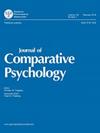幼儿(智人)的经济风险倾向是由探索行为驱动的吗?与卷尾猴(Sapajus apella)比较。
IF 1.1
4区 心理学
Q4 BEHAVIORAL SCIENCES
引用次数: 3
摘要
人类儿童和一些非人灵长类动物也表现出经济风险倾向。为了探索未知和意外的吸引力在经济选择中的作用,实验1向2.5岁的儿童和卷尾猴提供了一个赌博任务,参与者必须在两个选项中做出选择,一个是安全选项,另一个是以意外事件为特征的风险选项。与卷尾猴相比,幼儿表现出对风险选项的强烈偏好,而不是安全选项。在实验2中,尽管安全选项越来越明显,但幼儿仍然坚持他们的风险选择。与幼儿相比,卷尾猴在第二个实验中优先选择了安全的选项。我们认为,卷尾猴的风险厌恶反映了一种已知和安全选项的开发策略。在人类儿童中,不确定奖励的吸引力似乎与他们对新奇事物的追求有关。我们认为,幼儿在获得领域的风险倾向反映了一种探索性搜索策略。(PsycInfo Database Record (c) 2022 APA,版权所有)。本文章由计算机程序翻译,如有差异,请以英文原文为准。
Is economic risk proneness in young children (Homo sapiens) driven by exploratory behavior? A comparison with capuchin monkeys (Sapajus apella).
Economic risk proneness is displayed by human children and some nonhuman primate species. To explore the role of attraction toward the unknown and the unexpected in economic choices, 2.5-year-old children and capuchin monkeys were presented in Experiment 1 with a gambling task in which participants had to choose between 2 options, a secure option and a risky option characterized by an unexpected event. In contrast to capuchins, toddlers showed a strong preference for the risky option over the safe option. In Experiment 2, toddlers maintained their risky choices despite the increased salience of the safe option. In contrast to toddlers, capuchins preferentially chose the safe option in this second experiment. We argue that capuchins' risk aversion reflects an exploitation strategy of known and safe options. In human children, the attractiveness of uncertain reward appears to be linked to their novelty seeking. We argue that toddlers' risk proneness in the gain domain reflects an exploratory search strategy. (PsycInfo Database Record (c) 2022 APA, all rights reserved).
求助全文
通过发布文献求助,成功后即可免费获取论文全文。
去求助
来源期刊
CiteScore
3.30
自引率
7.10%
发文量
0
审稿时长
>12 weeks
期刊介绍:
The Journal of Comparative Psychology publishes original research from a comparative perspective
on the behavior, cognition, perception, and social relationships of diverse species.

 求助内容:
求助内容: 应助结果提醒方式:
应助结果提醒方式:


